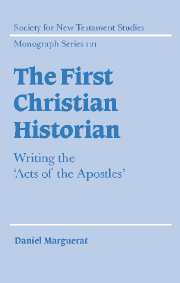Book contents
- Frontmatter
- Contents
- Preface
- 1 How Luke wrote history
- 2 A narrative of beginnings
- 3 The unity of Luke–Acts: the task of reading
- 4 A Christianity between Jerusalem and Rome
- 5 The God of Acts
- 6 The work of the Spirit
- 7 Jews and Christians in conflict
- 8 Ananias and Sapphira (Acts 5. 1–11): the original sin
- 9 Saul's conversion (Acts 9; 22; 26)
- 10 The enigma of the end of Acts (28. 16–31)
- 11 Travels and travellers
- Bibliography
- Index of passages
5 - The God of Acts
Published online by Cambridge University Press: 22 September 2009
- Frontmatter
- Contents
- Preface
- 1 How Luke wrote history
- 2 A narrative of beginnings
- 3 The unity of Luke–Acts: the task of reading
- 4 A Christianity between Jerusalem and Rome
- 5 The God of Acts
- 6 The work of the Spirit
- 7 Jews and Christians in conflict
- 8 Ananias and Sapphira (Acts 5. 1–11): the original sin
- 9 Saul's conversion (Acts 9; 22; 26)
- 10 The enigma of the end of Acts (28. 16–31)
- 11 Travels and travellers
- Bibliography
- Index of passages
Summary
What image of God does the author of Luke–Acts offer his readers? In the small number of studies devoted to this question, the majority offer an analysis of the contents, enumerating the characteristics with which Luke adorns the God of his narrative: God as the agent of salvation history, Jesus as the mirror of the Father's action, the joy of God at the return of the lost, the God Peter discovers to be universal (Acts 10–11), the providential God of the sermon in Athens, and so forth. Thus, there emerges the portrait of a God faithful to what he has promised, a God who moves toward a universal programme, and who is openly interventionist in his guidance of history.
However, this type of study, which consists in extracting from the Lucan text what it says about God, must be questioned in regard to its method. Marcel Dumais, in a recent account of the state of the research on the Acts of the Apostles, notes that an exhaustive portrait of the God of Luke remains to be painted, as research up to this point has focused on pneumatology, Christology, and the conception of history. In my opinion, such an enterprise cannot bypass the manner in which Luke, in his narrative, constructs a discourse about God. For if one presses the text of Luke in search of his statements about God, one accumulates in effect a jumble of parables, visions, logia and trances, human discourse and angelic revelations.
- Type
- Chapter
- Information
- The First Christian HistorianWriting the 'Acts of the Apostles', pp. 85 - 108Publisher: Cambridge University PressPrint publication year: 2002



